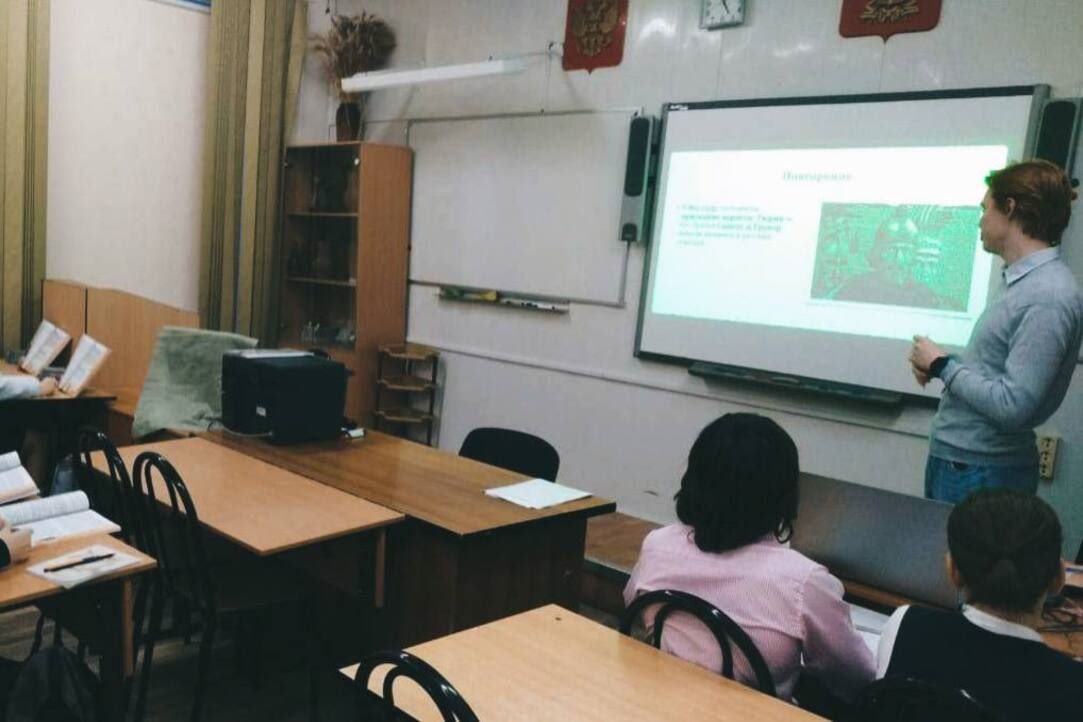Old Place, New Role

Most of the students were assigned to St. Petersburg gymnasiums and some had practice at schools in their hometowns. One of them, Maksim Kuznetsov, who shared with us his own experience of teaching practice.

Maksim Kuznetsov,
History Program Student, Saint Petersburg
My name is Maksim. I come from a small town in the Krasnodar Territory. I study at St. Petersburg campus of the Higher School of Economics, educational program “History”. I'm in my fourth year now. My academic interests are related to Soviet urban studies. In my free time, I like to listen to music, watch movies and read books.
I had no idea that we would be doing any practices. I learned about this directly during my studies from my classmates and from teachers, including the academic supervisor. I think that most of all I expected a museum practice, because after all, St. Petersburg is a city very rich in various landmarks. There are a lot of valuable, beautiful and impressive museums here that I wanted to discover and learn something new about. Therefore, yes, I expected a lot from the museum practice and waited for it most of all. It seemed to me that it would be very interesting and would help me to open up new horizons. And, of course, I also expected a teaching practice, although I did not understand in what format it would be conducted, because everything was changing. For example, when I was in the 1-2 year, senior students had it in a different format due to covid, so it was not clear what to expect.
To be honest, I have been thinking about working as a teacher since high school. I imagined myself as a teacher, so I expected this practice. I wanted to feel what it was like to stand alone in a calss room and be in the spot light of a large number of children. I expected to get this experience and understand what it's like to be a teacher. I wanted to know if it would suit me in the end.
I wanted to go back to my native school, to my original site and see what had changed there, what kind of children there were. Even in my second year at the university, I had a project related to school activities, in which I taught lessons for St. Petersburg schoolchildren of different ages. And then I saw what kind of schoolchildren are here in St. Petersburg. And when it was the time for my teaching practice, I wanted to compare pupils from regional cities and such large ones as St. Petersburg. It seemed to me that there are differences after all. And probably another reason was that I still thought it would be easier to do practice at my home school. I know a lot there, I know the teachers and the headmaster, and it would be easier to get into this atmosphere, I think. And I just wanted to go home.
What a good question! They were wonderful about my return in general. I met many teachers who taught when I was a pupil. We had a very warm and good conversation, just like old friends. I was glad. I also talked to my class teacher. She also helped me a lot in my practice, and I am immensely grateful to her for that. Thanks to the headmaster too. In general, the teachers and the headmaster were very happy to see me back. They are pleased that the pupils do not forget about school, come back and, so to speak, honor the memory.
I taught lessons to the sixth graders, that is, these are 12-year-old children on average. At that moment they were learning about the first Russian knyazes, and this is a very good topic. I only had two lessons to teach. But before I did them, I was present in other lessons as a guest to understand how the sixth grade lesson were taught. Overall, nothing has changed since my graduation. So, when planning my first lesson, I, of course, used a lecture format. Many are now trying to move away from it in schools, and this is well-reasoned. It is better to introduce more interactive tasks, group work and other things so that children do not just listen, but also get involved in the lesson. I agree with this, but still the lecture format is also important. The main thing is that during the lesson it should be combined with other teaching methods. We should explain everything clearly to children so that they understand what is being discussed. For example, I gave them printed tables that they filled out using a textbook. And then we discussed together what they had written. And if something was not completely clear to them, I just explained the unclear points in the form of a small lecture, showing the main materials on the presentation slides. So they had a complete picture of understanding, and I could see from them that I was not explaining in vain, that they really understood it. My teacher, who supervised my practice, said that working with a textbook is important, as is independent work in general. I agree with that. I also made a quiz for them with interesting facts about knyazs. I put some sentences or small texts on the slide, where the features of a particular knyaz were described, and the pupils all answered together. It turned out very well. In the second lesson, they were working in teams, making crosswords on the topic. Working in groups is also an important component. We were told about this both at the pedagogy course at the university and at my minor, which I studied in 2-3 courses. Not everyone knows how to work in teams, so we need to develop this skill in children at an early age, because it will be useful to them later at university, at work and in life in general.
I liked most of all to see the joy in the children’s eyes, to see their understanding and to feel the impact. We really interacted very well. After all, it's easy for kids in the sixth grade to get distracted by anything, so when I saw that they were listening to me carefully and interacting with me and each other, I was happy. I still remember their happy faces. This is a very valuable experience.
Coincidentally, I taught classes in the same classroom where I studied in high school in grades 10-11, since this is my class teacher's classroom. Nothing has changed there at all. Of course, I had a feeling of nostalgia for my school days. But there was also a bit of excitement, because it was still unclear how everything would go, whether the children would understand me. I was afraid that there might be no discipline in class. But everything went great, as I said. And this nostalgia, a sense of joy filled me constantly, because after all, this is my school. Even if I didn't like going there as a child that much, it feels different now. And, of course, the way the teachers reacted and treated me when they saw me added pleasant emotions.
For a long time I thought about becoming a teacher in the future, and after completing the practice, these thoughts stuck in my head more strongly. If nothing changes, I will be really glad to become a teacher, and not the fact that the history one. I am also attracted to other disciplines. In the opinion of my class teacher and in my opinion, I did very well in my teaching practice. Even the children asked me at the end of the lesson if I was going to teache once or a couple of times. I told them that it was only for those two lessons. One boy was particularly upset and said it was a bummer! And in general, all the children were thankful for the lesson. And this feedback and the fact that the children liked it, only strengthened my desire to become a teacher and connect my life with teaching activities. However, not at the university, but at school.
First, I would advise them to listen to themselves, to their inner voice when preparing to work with school children. Many people say what is worth doing when working with children and what is not worth it, but it is important to remember that all schools and children are different. Not everyone studies in gymnasiums, lyceums or "elite" schools, so the recommendations that teachers at the university give us are not suitable for everyone. Therefore, first of all, you need to listen to yourself. If you understand that it will be better this way, then you need to do it this way. Within the framework of adequacy, of course. Try to imagine yourself in the teacher's place, think about how he or she feels. Don't worry too much, because it's actually not that scary. A lot depends on your personal mood. It is also important not to forget to prepare a lesson plan in advance, a lesson plan that you will teach. For example, I had a printed lesson plan with all the timings. I was still used to the fact that the lessons in university go for one hour and twenty minutes, so it was a little hard to adjust to a forty-minute lesson. And the plan helped me with that. It helped me not to lose time and manage to do everything, focusing on the scheduled timings. I would also advise them to keep in touch with their supervisors during practice, that is, a teacher or a methodologist who is assigned to you. This person can help you, say some helpful things, so it is important to listen to the curator too. And don't forget to combine different activities. Handouts, flashcards, practical assignments, quizzes and group work. All this is very important and will help you to have a perfect lesson.
We hope that the advice Maksim shared with us and his experience in general will help other students get the same positive emotions from their teaching practice!
Intreview by

